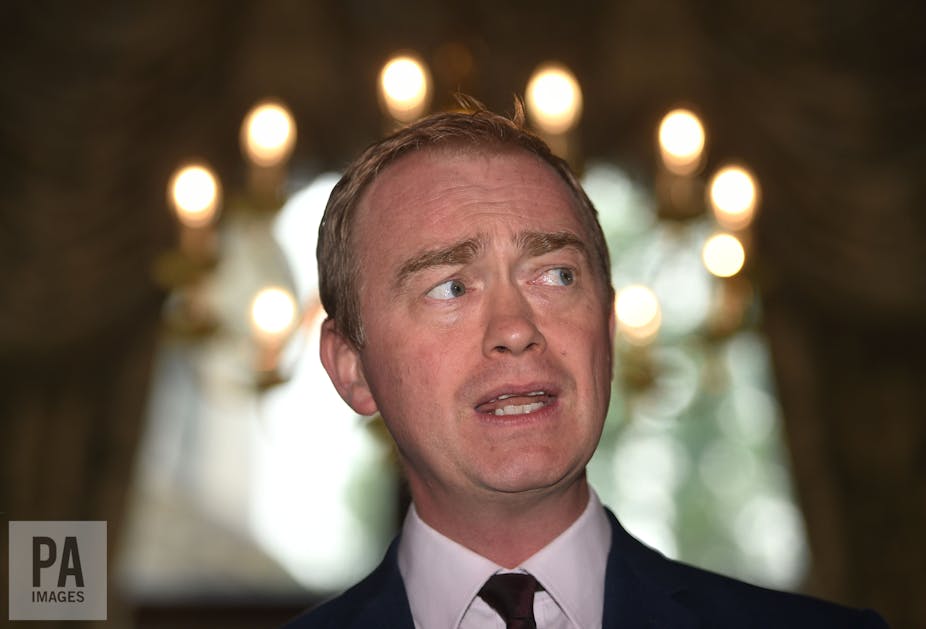After gaining ground in a general election, a leader does not usually step aside. But Liberal Democrat Tim Farron did. He chose to leave because he found himself “torn between living as a faithful Christian and serving as a political leader”.
Farron’s religious views were closely scrutinised during the election campaign, like no other politician’s were. He was repeatedly questioned about his views on homosexuality, for example, following reports that he had in the past failed to explicitly deny that he considered gay sex sinful.
Many liberals argue that politicians and public officials should be free to express their religious views and values in public. That is as long as they ultimately justify their political decisions based on reasons that all citizens – not only religious ones – can accept.
I agree, and also believe that partisans like Farron are always inevitably torn between two very different kinds of commitments. This is due to their unique position halfway between the state and civil society.
On the one hand, like other public officials, politicians (and especially party leaders) must commit to the general interest and the common good. This is because their ability to affect decision-making, especially if they are elected to power, will have an effect on the whole of society, not just on a part of it. On the other hand, politicians must respond to their voters’ views and values, which will often reflect partial, rather than general, interests.
Responsible partisanship
In his resignation speech, Farron explicitly rejected the kind of theocratic politics that aims to impose sectarian religious views on the whole of society, rather than promoting the general interest and the common good.

“There are Christians in politics,” Farron argued, “who take the view that they should impose the tenets of faith on society. But I have not taken that approach because I disagree with it – it’s not liberal and it is counterproductive when it comes to advancing the gospel.”
Farron’s political record, including his support for same sex marriage legislation, shows that he has generally complied with this vision. His Christianity does not seem to have interfered with his ability to respond to the interests and values of Liberal Democrat voters – among whom there will be gay people, as well as many non-Christians and atheists.
So was it right for Farron’s views to be scrutinised to such an extent that he felt “torn between” politics and religion? If the scrutiny had been directed at his religious views, there would have been nothing wrong with it. In a liberal society, citizens should be free to respectfully challenge others’ views, religious or not.
However, the criticism directed at Farron as a politician and, more specifically, as a partisan leader, seems unfair. Farron’s religion did not prevent him from being loyal both to the general interest and to his voters.
It may be that scrutiny during the election campaign only made Farron more aware of an already existing tension between his religious and political views. But this too is something we shouldn’t – and probably can’t – avoid in a liberal democracy. A religious person’s decision to engage in party politics is a voluntary choice. Anyone who enters party politics should know that they will inevitably experience some tension between their private views and their public duties.
Perhaps, however, the problem is more general. If there were a greater variety of political parties in the UK, one might argue, religious citizens like Farron would be able to find a more suitable party in which they could experience a lesser tension between their political and religious views.
Indeed for some it was strange that Farron chose the Lib Dems – but what other party could he have chosen? What other party can a religious citizen join in the UK, if they wish to have a potential impact on decision-making and do not agree with any of the three major parties’ political platforms? In other European countries, for example, Christian Democratic parties such as Germany’s Christlich Demokratische Union Deutschlands and Italy’s former Democrazia Cristiana have allowed many religious citizens to combine their political and religious views when participating in party politics.
The lack of a major Christian Democratic party and, more generally, of a sufficiently diverse party system in the UK, may actually be a substantial obstacle to many citzens’ ability to participate in party politics. But this problem, and the question of how it could be resolved, is a topic to be examined elsewhere.
For now, one thing is clear: Farron’s religion should never have been the reason he felt compelled to leave his role as Liberal Democrat leader.

